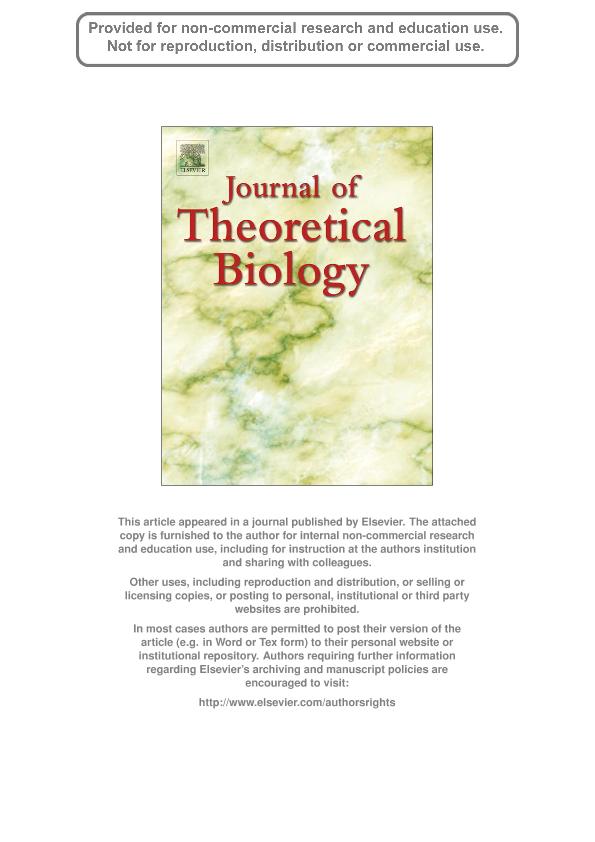Mostrar el registro sencillo del ítem
dc.contributor.author
Barton, Alejandro

dc.contributor.author
Fendrik, Alejandro José

dc.date.available
2017-09-08T21:11:09Z
dc.date.issued
2013-03
dc.identifier.citation
Barton, Alejandro; Fendrik, Alejandro José; Sustained vs. oscillating expressions of Ngn2, Dll1 and Hes1: A model of neural differentiation of embryonic telencephalon; Elsevier; Journal of Theoretical Biology; 328; 3-2013; 1-8
dc.identifier.issn
0022-5193
dc.identifier.uri
http://hdl.handle.net/11336/23886
dc.description.abstract
During embryonic development of the mammalian telencephalon, expressions of the Notch ligand: Delta like1 (Dll1), Hes1 and the proneural gene Neu- rogenin 2 (Ngn2) are oscillating in neural progenitors, being sustained in postmitotic neurons (upregulated for Ngn2 and Dll1 and downregulated for Hes1), suggesting a sustained vs. oscillating behavior in proneural genes is critical in neural fate dicitions. Moreover, beyond the controversies over the role of mNumb in determining neural fate in mammals, there is evidence that their heritage during the neurogenic division is involved in neural specification. It is also known that mNumb activates Notch1 receptor degradation. A suggested mechanism that unifies two experimental lines, is the arresting the oscillations in the cell specified by the Notch1 receptor degradation by mNumb during neurogenic division. We introduce a modification in a previous model of the gene network for two coupled cells by Delta - Notch(Wang et al., 2011). We analyze the consequences of an asymmetry in the rate of degradation of Notch between two neighbor cells (mimicking a possible effect of Numb in asymmetric neurogenic division). The model shows that a slight difference in Notch degradation between two cells maintains the oscillations in one of them while it and arrests them in the neighbor, thus describing the phenomenon of the oscillating vs. sustained expression in the neural differentiation (neural progenitors vs. postmitotic neurons). In addition, when canceling the coupling Delta - Notch, both cells show subtained expressions with levels of Ngn2 and Dll1 upregulated and Hes1 downregulated. These results are consistent with a role of Numb in inducing the differentiation by inhibiting the oscillations in the Notch signaling as well as the function of this pathway in the maintenance of neural progenitors. The model is stable against fluctuations in the values of the parameters. Moreover, given the spatially localized character of mitosis, we introduce the effect of neighboring cells in a self-consistent approximation. Both, parameters fluctuations as will as the effect of the environment, lead to asynchronous character of oscillations of Hes1/Ngn2 in progenitor cells.
dc.format
application/pdf
dc.language.iso
eng
dc.publisher
Elsevier

dc.rights
info:eu-repo/semantics/openAccess
dc.rights.uri
https://creativecommons.org/licenses/by-nc-sa/2.5/ar/
dc.subject
Hes1 Oscillations
dc.subject
Neural Progenitors
dc.subject
Gene Network Modeling
dc.subject.classification
Bioquímica y Biología Molecular

dc.subject.classification
Ciencias Biológicas

dc.subject.classification
CIENCIAS NATURALES Y EXACTAS

dc.title
Sustained vs. oscillating expressions of Ngn2, Dll1 and Hes1: A model of neural differentiation of embryonic telencephalon
dc.type
info:eu-repo/semantics/article
dc.type
info:ar-repo/semantics/artículo
dc.type
info:eu-repo/semantics/publishedVersion
dc.date.updated
2017-09-08T20:23:01Z
dc.journal.volume
328
dc.journal.pagination
1-8
dc.journal.pais
Países Bajos

dc.journal.ciudad
Ámsterdam
dc.description.fil
Fil: Barton, Alejandro. Universidad Nacional de General Sarmiento; Argentina. Consejo Nacional de Investigaciones Científicas y Técnicas; Argentina
dc.description.fil
Fil: Fendrik, Alejandro José. Universidad Nacional de General Sarmiento; Argentina. Consejo Nacional de Investigaciones Científicas y Técnicas; Argentina
dc.journal.title
Journal of Theoretical Biology

dc.relation.alternativeid
info:eu-repo/semantics/altIdentifier/url/http://www.sciencedirect.com/science/article/pii/S0022519313000969
dc.relation.alternativeid
info:eu-repo/semantics/altIdentifier/doi/http://dx.doi.org/10.1016/j.jtbi.2013.03.004
Archivos asociados
